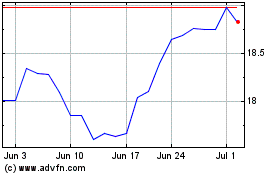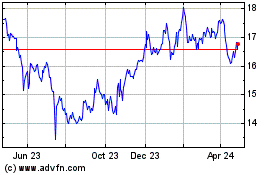By Jack Marshall and Suzanne Vranica
Marketers and advertising agencies are seizing on the uproar
over Google's placement of ads on unsavory sites, using it as a
chance to press the tech giant for changes they've long sought, as
the controversy extends beyond the U.K to other countries.
A host of brands cut their U.K. ad spending with Google after
learning that their ads had run alongside content such as videos by
terrorist sympathizers. Google has pledged to provide more control
and visibility over where ads appear.
In the past several days, executives at the biggest media-buying
agencies have been fielding calls from marketers eager to find out
more about whether their own ads have landed alongside undesirable
content, not just in the U.K. but worldwide, and have been pressing
Google for answers.
Marketers outside the U.K. are starting to take action. Telecom
giant AT&T Inc., one of the largest U.S. advertisers, said
Wednesday it is pulling its ad spending from YouTube and Google
Display Network, which shows ads on third-party sites.
Meanwhile, a global beverage company has pulled most of its ads
from the same Google services in about 30 countries including the
U.S., according to a person familiar with the situation. The
pullback does not include search ads, and in a few smaller markets
the beverage giant will continue to buy inventory from "Google
Preferred," which is considered to have YouTube's most
brand-friendly content, the person said.
"We don't comment on individual customers but as announced,
we've begun an extensive review of our advertising policies and
have made a public commitment to put in place changes that give
brands more control over where their ads appear," Google said in a
statement. "We're also raising the bar for our ads policies to
further safeguard our advertisers' brands."
Agency executives and advertisers have been in talks with Google
to press for more details on the new tools it will provide.
Industry executives have long called on Google to enact better
brand-safety features, but the high-profile nature of the current
flare-up has given them an opportunity to make that case
aggressively.
"We've been talking about brand safety for 20 years. It's not a
new phenomenon," said David Cohen, president of Interpublic Group
of Cos ad buying group Magna Global North America. "We have had a
couple conversations with Google over the past couple days. We're
exerting pressure to do more."
Mr. Cohen said his company is asking for more specifics about
the brand safety measures Google said it would implement, and that
it wants Google to be more accessible to third party companies that
verify the safety of web ad inventory on behalf of brands.
Given the increasing market dominance of Google and Facebook --
who together collected nearly 47% of digital ad dollars spent
worldwide in 2016, according to eMarketer -- some ad experts say
marketers and ad holding companies have an incentive to push back
on the companies whenever possible.
"When two companies control such a large majority of the
advertising, it undermines the legitimacy of the holding companies
and the leverage they have in the marketplace," said Ian Schafer,
chief executive officer of digital agency Deep Focus.
Ad executives acknowledge that is hard for Google to police and
quality-check the huge volume of content on YouTube and across its
network of third-party websites. They also point to Google's
obvious incentives -- to sell ad space alongside as much content as
possible, with no unnecessary limitations.
Rob Norman, chief digital officer at GroupM, an ad buying unit
of WPP Plc, said it remains to be seen how effective and practical
Google's new tools will be for marketers.
"[Google] has recognized that it has to provide greater
protection to the public and greater protection to advertisers,"
Mr. Norman said.
The person familiar with the beverage giant's move said the
company must see "real hard evidence that they are fixing the
problem."
The U.K. unit of France's Havas SA last week pulled ads for its
clients in the U.K. off Google Display Network and YouTube. Havas
SA's Chief Executive Yannick Bolloré said his firm is working with
some marketers to explore if they should be removing ads everywhere
in the world, not just in the U.K.
"Right now it is only discussions. I will know more in a couple
of days, " he said.
As for why Havas hasn't already suspended advertising on Google
properties in other countries, Mr. Bolloré said, "we had proof that
it happened in the U.K. and I haven't received any proof that it
happened in other markets."
The fight over ad placements adds to widening tensions between
Madison Avenue and Google, as well as fellow advertising behemoth
Facebook. Advertisers routinely raise concerns about other matters
such as the inability to get reliable, independently verified data
from the companies.
Mr. Bolloré said the increased anxiety of marketers lately on a
range of issues in the digital sphere underscores the value of
agencies.
"I think the more there's complexity in the space around
measurement, fake news or the more recent problem with Google, the
more our clients will have to rely on media agencies to drive trust
and help them invest wisely," he said.
Write to Jack Marshall at Jack.Marshall@wsj.com and Suzanne
Vranica at suzanne.vranica@wsj.com
(END) Dow Jones Newswires
March 22, 2017 18:14 ET (22:14 GMT)
Copyright (c) 2017 Dow Jones & Company, Inc.
AT&T (NYSE:T)
Historical Stock Chart
From Mar 2024 to Apr 2024

AT&T (NYSE:T)
Historical Stock Chart
From Apr 2023 to Apr 2024
